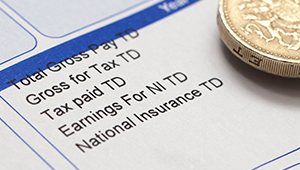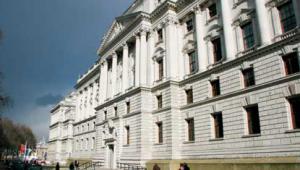In its latest analysis of the UK economy, the fiscal watchdog said it anticipated the government would borrow £73.5bn in 2015/16, or 3.9% of gross domestic product. This is up from the £69.5bn forecast in the Summer Budget, including an estimated £4.6bn shift in projections following the reclassification of social housing providers.
However, over the period to 2019/20, the OBR is predicting a cumulative £27bn improvement in the health of the public finances due to both improvements in tax receipts and lower debt interest.
This means that borrowing will fall to £49.9bn (2.5% of GDP) next year, then to £24.8bn (1.2% of GDP) in 2017/18 and £4.6bn (0.2%) in 2018/19.
A surplus of £10.1bn is now expected in 2019/20, around £100m higher than set out in the summer Budget.
Osborne said the spending plans meant that Britain would be “out of the red and into the black”.
The OBR predicted economic growth of 2.4% this year, and had revised up output for the next two years, to 2.4% in 2016 and 2.5% in 2017.
Once a new baseline of national debt is set to account for the reclassification of housing associations, the OBR also stated this would fall in every year of the forecast period as percentage of GDP. Debt is predicted to fall from 82.5% of GDP this year to 81.7% in 2016/17, 79.9% in 2017/18, reaching 74.3% in 2019/20, the year the public finances return to surplus.
This improvement in the nation’s finances is due to two things, Osborne told MPs.
“First, the OBR expects tax receipts to be stronger. A sign that our economy is healthier than thought.
“Second, debt interest payments are expected to be lower – reflecting the further fall in the rates we pay to our creditors.
“Combine the effects of better tax receipts and lower debt interest, and overall the OBR calculate it means a £27bn improvement in our public finances over the forecast period, compared to where we were at the Budget.”












